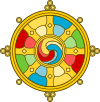Jnanasutra
There appear to be two Jnanasutras, with different Tibetan orthographies for their names.
| Part of a series on |
| Tibetan Buddhism |
|---|
 |
|
|
|
Practices and attainment |
|
Institutional roles |
|
History and overview |
The first, Wylie: ye shes mdo ,[1] flourished from the 5th-6th centuries. According to Dzogchen legends, he was an early Dzogchen practitioner of Vajrayāna Buddhism and a disciple of Sri Singha. This Jnanasutra was a spiritual brother of Vimalamitra, another principal disciple of Sri Singha.[2]
According to Tarthang Tulku (1980),[3] the second Jnanasutra was the principal lotsawa (Wylie: ye shes sde ) of the 8th-9th century of the first wave of translations from Sanskrit to Tibetan.[4]
In Jigme Lingpa's terma of the ngöndro of the Longchen Nyingthig he writes what approximates the phonemic Sanskrit of 'Jnanasutra' in Tibetan script as Tibetan: ཛྙཱ་ན་སཱུ་ཏྲ, Wylie: dznyā na sū tra , rather than his name in Tibetan and this comes just after a sentence to Sri Singha and before mentioning Vimalamitra.
References
- Dharma Dictionary (2008). Jnanasutra (accessed: January 29, 2008)
- Dowman, Keith (undated). Legends of the Dzogchen Masters. Source: (accessed: January 29, 2008)
- Tarthang Tulku (1980), Guide to the Nyingma Edition of the sDe-dge bKa '-'gyur/bsTan-'gur. Vol. 1, California, USA, 1980
- Rhaldi, Sherab (undated). 'Ye-Shes-sDe; Tibetan Scholar and Saint'. Tibetan & Himalayan Digital Library. Source: (accessed: Wednesday April 1, 2009)